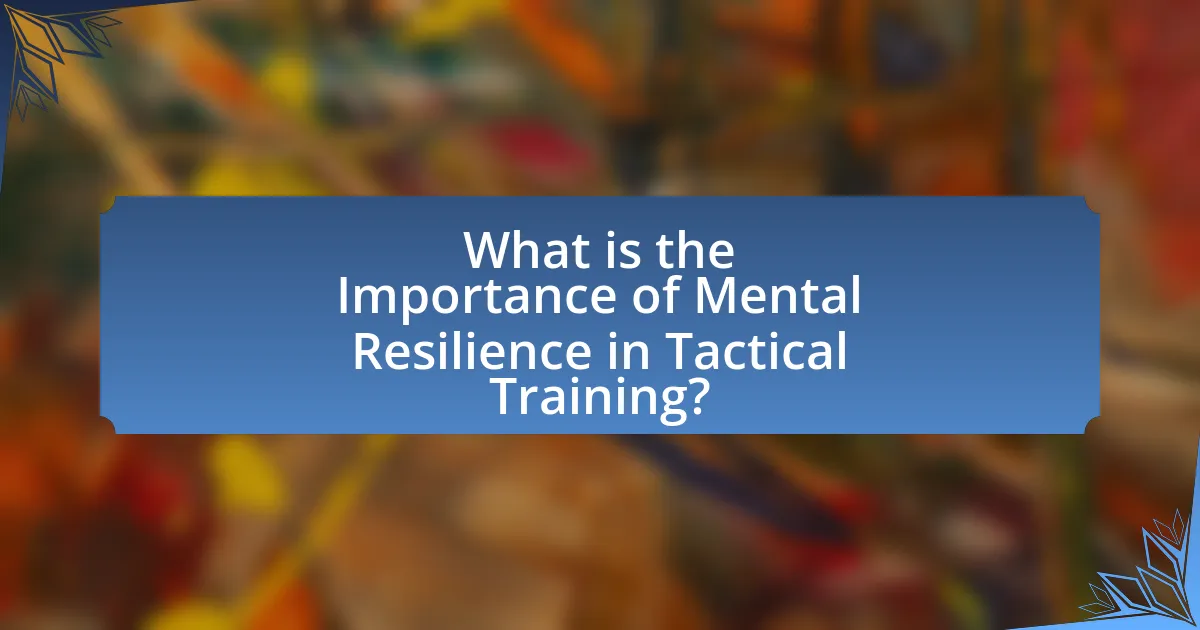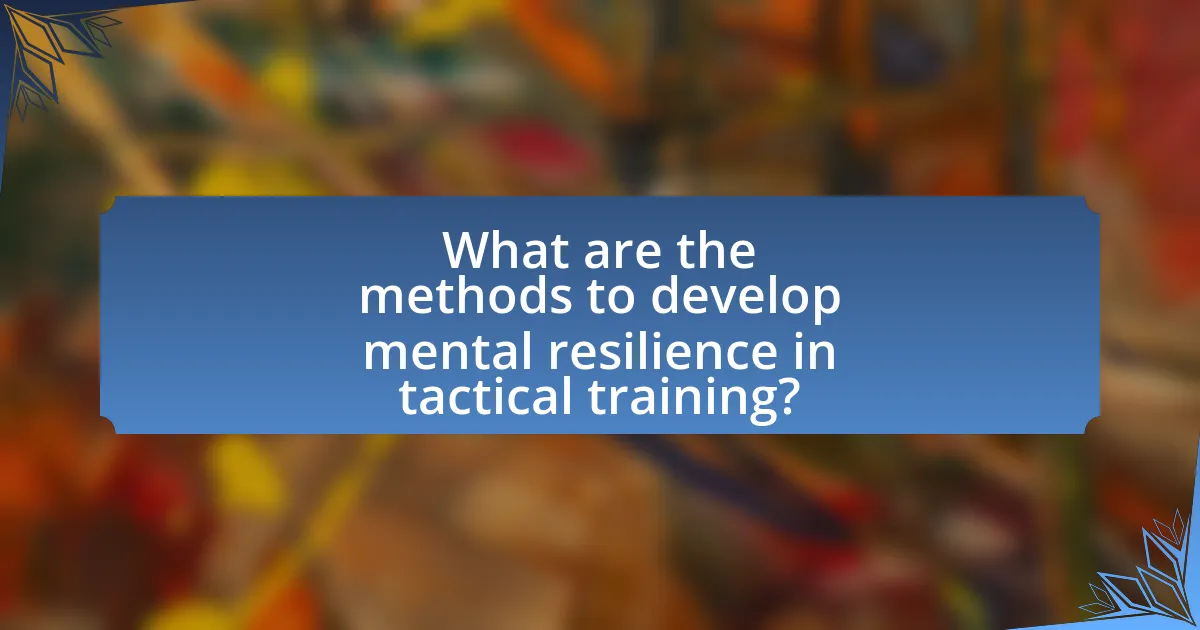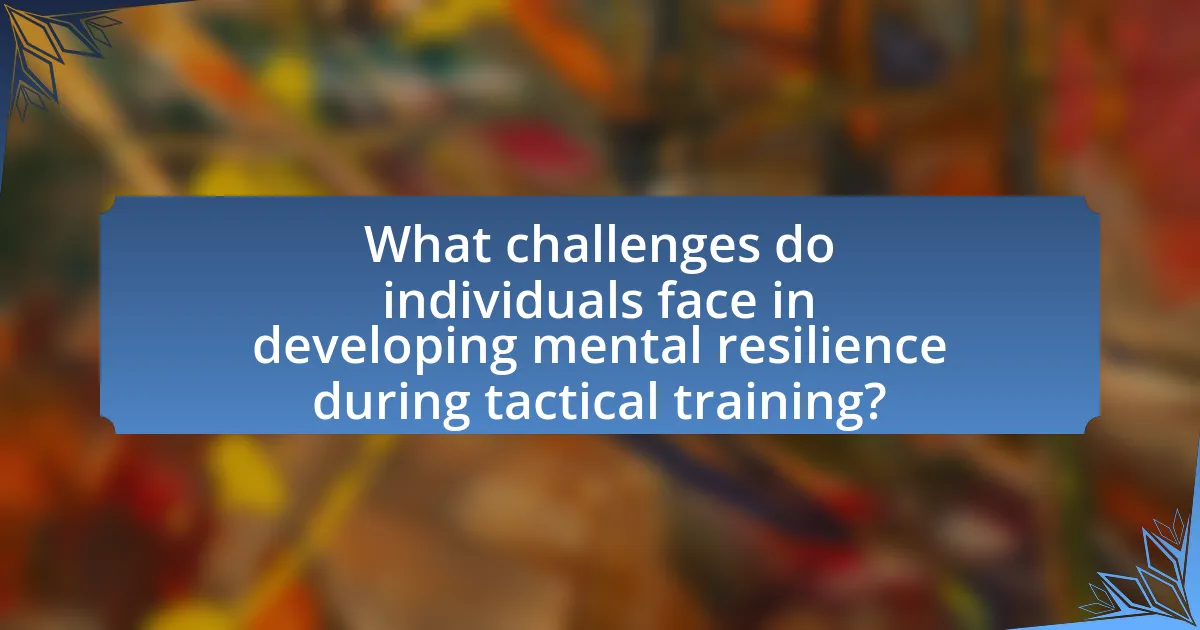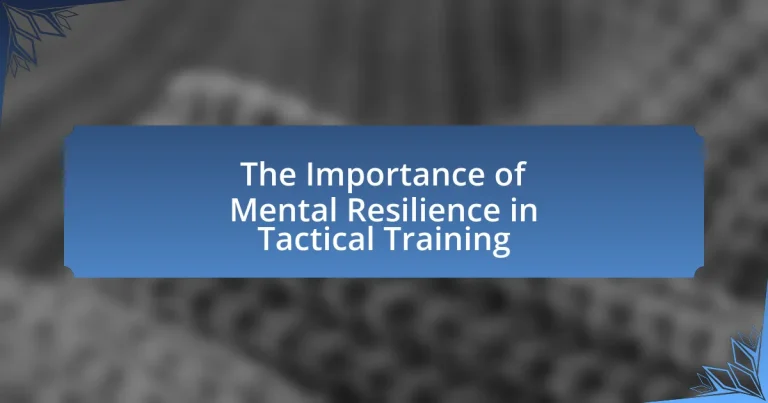Mental resilience is a critical component of tactical training, enabling individuals to cope with stress, adapt to challenging situations, and maintain performance under pressure. This article explores the significance of mental resilience in high-stakes environments, such as military operations and emergency response, highlighting its impact on decision-making, teamwork, and overall mission success. Key elements of mental resilience, including adaptability, emotional regulation, and support systems, are examined, along with effective training techniques like cognitive-behavioral strategies and mindfulness practices. Additionally, the article addresses challenges faced in developing resilience and offers strategies to overcome these obstacles, emphasizing the role of organizational culture and leadership in fostering a resilient mindset among tactical personnel.

What is the Importance of Mental Resilience in Tactical Training?
Mental resilience is crucial in tactical training as it enables individuals to effectively cope with stress, adapt to challenging situations, and maintain performance under pressure. This psychological strength allows trainees to face high-stakes environments, such as combat or emergency response, where decision-making and emotional control are vital. Research indicates that mental resilience can significantly enhance operational effectiveness; for instance, a study published in the Journal of Military Psychology found that resilient soldiers demonstrated better problem-solving skills and lower levels of anxiety during training exercises. Thus, mental resilience not only supports individual well-being but also contributes to overall mission success in tactical settings.
Why is mental resilience crucial for tactical training?
Mental resilience is crucial for tactical training because it enables individuals to effectively cope with stress, adapt to challenging situations, and maintain focus under pressure. In high-stakes environments, such as military operations or emergency response scenarios, mental resilience allows personnel to make quick, rational decisions despite the chaos surrounding them. Research indicates that resilient individuals are better equipped to handle adversity, which is essential in tactical settings where the consequences of poor decision-making can be severe. For instance, a study published in the Journal of Occupational Health Psychology found that mental resilience significantly correlates with performance outcomes in high-stress occupations, highlighting its importance in tactical training.
What are the key elements of mental resilience in this context?
The key elements of mental resilience in the context of tactical training include adaptability, emotional regulation, and a strong support system. Adaptability allows individuals to adjust their strategies and responses in high-pressure situations, which is crucial in tactical environments. Emotional regulation enables individuals to manage stress and maintain focus, preventing emotional responses from impairing decision-making. A strong support system, including peers and mentors, provides encouragement and resources, fostering a sense of belonging and shared experience. These elements collectively enhance performance and well-being in demanding scenarios, as evidenced by studies showing that resilient individuals are better equipped to handle stress and recover from setbacks.
How does mental resilience impact performance in high-stress situations?
Mental resilience significantly enhances performance in high-stress situations by enabling individuals to maintain focus, adapt to challenges, and recover from setbacks. Research indicates that resilient individuals exhibit better emotional regulation, which allows them to manage anxiety and stress effectively, leading to improved decision-making and problem-solving abilities under pressure. For instance, a study published in the Journal of Occupational Health Psychology found that employees with higher resilience scores reported lower levels of stress and higher job performance during demanding tasks. This demonstrates that mental resilience not only helps individuals cope with stress but also directly correlates with their ability to perform optimally in critical situations.
How does mental resilience differ from physical resilience in tactical training?
Mental resilience in tactical training refers to the ability to maintain focus, adapt to stress, and recover from setbacks, while physical resilience pertains to the body’s capacity to endure physical challenges and recover from exertion. Mental resilience is crucial for decision-making under pressure, as evidenced by studies showing that soldiers with higher mental resilience perform better in high-stress situations, such as combat scenarios. In contrast, physical resilience is often measured by endurance and strength, which are essential for completing physically demanding tasks. Research indicates that while both types of resilience are important, mental resilience can significantly enhance performance in unpredictable environments, as it allows individuals to cope with psychological stressors that physical training alone cannot address.
What role does mental resilience play in decision-making during tactical operations?
Mental resilience significantly enhances decision-making during tactical operations by enabling individuals to maintain focus and composure under pressure. This psychological strength allows personnel to process information effectively, assess risks accurately, and make timely decisions despite high-stress environments. Research indicates that resilient individuals are better equipped to adapt to changing circumstances and recover from setbacks, which is crucial in tactical scenarios where rapid and effective decision-making can impact mission success. For instance, studies have shown that military personnel with higher levels of mental resilience demonstrate improved performance in simulated combat situations, highlighting the direct correlation between resilience and effective decision-making in tactical operations.
How can mental resilience enhance teamwork and communication in tactical settings?
Mental resilience enhances teamwork and communication in tactical settings by enabling individuals to maintain focus and composure under pressure. This ability allows team members to effectively share information, make quick decisions, and adapt to changing circumstances, which is crucial in high-stakes environments. Research indicates that resilient teams demonstrate improved collaboration and problem-solving skills, as they can navigate stress and conflict more effectively. For instance, a study published in the Journal of Applied Psychology found that teams with higher levels of resilience showed a 25% increase in performance during simulated crisis scenarios, highlighting the direct impact of mental resilience on operational effectiveness.

What are the methods to develop mental resilience in tactical training?
Methods to develop mental resilience in tactical training include exposure to high-stress scenarios, cognitive-behavioral techniques, and mindfulness practices. Exposure to high-stress scenarios, such as simulated combat or emergency situations, helps individuals learn to manage stress and make quick decisions under pressure. Cognitive-behavioral techniques, which involve identifying and challenging negative thought patterns, enhance problem-solving skills and foster a positive mindset. Mindfulness practices, such as meditation and focused breathing, improve emotional regulation and concentration, allowing trainees to remain calm and focused during challenging situations. Research indicates that these methods significantly enhance performance and adaptability in high-stakes environments, as evidenced by studies showing improved stress management and decision-making skills among military personnel who undergo such training.
What training techniques are effective for building mental resilience?
Effective training techniques for building mental resilience include cognitive-behavioral training, mindfulness practices, and exposure to stress simulations. Cognitive-behavioral training helps individuals identify and reframe negative thought patterns, enhancing their ability to cope with challenges. Mindfulness practices, such as meditation and deep-breathing exercises, improve emotional regulation and focus, which are crucial in high-pressure situations. Exposure to stress simulations, often used in tactical training, allows individuals to experience and manage stress in a controlled environment, thereby increasing their resilience. Research by the American Psychological Association indicates that these techniques can significantly improve mental toughness and adaptability in stressful scenarios.
How do simulation exercises contribute to mental resilience?
Simulation exercises enhance mental resilience by providing individuals with realistic scenarios that challenge their cognitive and emotional responses. These exercises allow participants to practice decision-making under pressure, which fosters adaptability and stress management. Research indicates that repeated exposure to simulated stressors can lead to improved coping strategies and increased confidence in handling real-life challenges, as evidenced by studies showing that military personnel who engage in simulation training demonstrate greater resilience in high-stress situations.
What role does stress inoculation training play in developing resilience?
Stress inoculation training plays a crucial role in developing resilience by equipping individuals with coping strategies to manage stress effectively. This training involves exposing participants to controlled stressors, allowing them to practice and refine their responses in a safe environment. Research indicates that such exposure enhances emotional regulation and problem-solving skills, which are essential components of resilience. For instance, a study published in the Journal of Occupational Health Psychology found that individuals who underwent stress inoculation training reported lower anxiety levels and improved performance under pressure, demonstrating the training’s effectiveness in fostering resilience.
How can mindfulness and mental conditioning improve resilience?
Mindfulness and mental conditioning enhance resilience by fostering emotional regulation and stress management. Mindfulness practices, such as meditation, enable individuals to develop greater awareness of their thoughts and feelings, allowing them to respond to stressors more effectively rather than reacting impulsively. Research indicates that mindfulness training can lead to significant reductions in anxiety and depression, which are critical for maintaining resilience in high-pressure situations. For instance, a study published in the journal “Psychological Science” found that participants who engaged in mindfulness meditation showed improved emotional regulation and resilience compared to those who did not practice mindfulness. Mental conditioning techniques, such as visualization and positive self-talk, further reinforce this resilience by helping individuals prepare for challenges and maintain focus under pressure. Together, these practices create a robust framework for enhancing mental resilience, particularly in tactical training environments where stress and uncertainty are prevalent.
What specific mindfulness practices are beneficial for tactical personnel?
Specific mindfulness practices beneficial for tactical personnel include focused breathing exercises, body scanning, and visualization techniques. Focused breathing exercises help regulate stress responses and enhance concentration, which is crucial in high-pressure situations. Body scanning promotes awareness of physical sensations and can reduce anxiety, allowing personnel to maintain composure. Visualization techniques enable tactical personnel to mentally rehearse scenarios, improving decision-making and performance under stress. Research indicates that these practices can enhance mental resilience, as evidenced by a study published in the Journal of Occupational Health Psychology, which found that mindfulness training significantly improved stress management and performance in high-stakes environments.
How does visualization enhance mental resilience in tactical scenarios?
Visualization enhances mental resilience in tactical scenarios by enabling individuals to mentally rehearse and prepare for high-pressure situations. This cognitive technique allows personnel to create detailed mental images of potential challenges, thereby reducing anxiety and improving focus during actual events. Research indicates that athletes and military personnel who engage in visualization techniques demonstrate increased confidence and performance under stress, as evidenced by a study published in the Journal of Applied Sport Psychology, which found that mental imagery significantly improved coping strategies and resilience in competitive environments.

What challenges do individuals face in developing mental resilience during tactical training?
Individuals face several challenges in developing mental resilience during tactical training, including high levels of stress, physical exhaustion, and the pressure to perform under extreme conditions. These factors can lead to anxiety and self-doubt, which hinder the ability to maintain focus and composure. Research indicates that prolonged exposure to stressful environments can negatively impact cognitive functions, making it difficult for individuals to adapt and recover from setbacks. Additionally, the competitive nature of tactical training often fosters a fear of failure, further complicating the development of resilience.
What common obstacles hinder the development of mental resilience?
Common obstacles that hinder the development of mental resilience include negative self-talk, lack of social support, and exposure to chronic stress. Negative self-talk can undermine confidence and lead to a defeatist mindset, making it difficult for individuals to cope with challenges effectively. Lack of social support limits access to encouragement and resources that are crucial for building resilience. Additionally, chronic stress can overwhelm an individual’s coping mechanisms, leading to burnout and decreased mental fortitude. Research indicates that individuals with strong social networks are more likely to develop resilience, as highlighted in studies by Taylor et al. (2004) in the Journal of Personality and Social Psychology, which emphasize the protective role of social support in stress management.
How can fear and anxiety affect mental resilience in tactical training?
Fear and anxiety can significantly diminish mental resilience in tactical training by impairing focus and decision-making abilities. When individuals experience high levels of fear or anxiety, their cognitive resources become overwhelmed, leading to decreased performance under pressure. Research indicates that stress responses can trigger the fight-or-flight mechanism, which may result in avoidance behaviors and hinder the ability to adapt to challenging situations. For instance, a study published in the Journal of Occupational Health Psychology found that heightened anxiety levels correlate with reduced problem-solving skills and increased likelihood of errors in high-stakes environments. This evidence underscores the critical impact of fear and anxiety on mental resilience, ultimately affecting the effectiveness of tactical training.
What strategies can overcome these challenges?
Strategies to overcome challenges in mental resilience during tactical training include implementing structured mental conditioning programs, fostering a supportive training environment, and utilizing stress inoculation techniques. Structured mental conditioning programs, such as cognitive-behavioral training, have been shown to enhance resilience by teaching individuals how to manage stress and adapt to high-pressure situations effectively. A supportive training environment encourages open communication and peer support, which can significantly reduce anxiety and improve performance under stress. Stress inoculation techniques, which involve gradual exposure to stressors in a controlled setting, prepare individuals to handle real-life challenges more effectively. Research indicates that these strategies collectively improve mental resilience, leading to better outcomes in tactical training scenarios.
How does organizational culture influence mental resilience in tactical training?
Organizational culture significantly influences mental resilience in tactical training by shaping the attitudes, behaviors, and support systems that personnel experience. A positive organizational culture fosters an environment of trust, open communication, and shared values, which enhances individuals’ ability to cope with stress and adversity during training. Research indicates that organizations with strong, supportive cultures report higher levels of resilience among their members, as seen in military units where camaraderie and mutual support are emphasized. This cultural framework not only prepares individuals for the challenges of tactical training but also reinforces their psychological fortitude, enabling them to perform effectively under pressure.
What role does leadership play in fostering a resilient mindset?
Leadership plays a crucial role in fostering a resilient mindset by setting the tone for organizational culture and providing support during challenges. Effective leaders model resilience through their actions, demonstrating adaptability and perseverance, which encourages team members to adopt similar attitudes. Research indicates that leaders who communicate openly and provide constructive feedback create an environment where individuals feel safe to take risks and learn from failures, thereby enhancing their resilience. For instance, a study published in the Journal of Occupational Health Psychology found that supportive leadership significantly correlates with increased employee resilience and well-being.
How can peer support enhance mental resilience among tactical teams?
Peer support enhances mental resilience among tactical teams by fostering a sense of belonging and shared experience, which is crucial in high-stress environments. When team members engage in mutual support, they can share coping strategies, reduce feelings of isolation, and build trust, all of which contribute to improved emotional stability. Research indicates that peer support can lead to a 30% increase in resilience scores among military personnel, as highlighted in the study “The Role of Peer Support in Enhancing Resilience” published in the Journal of Military Psychology. This evidence underscores the effectiveness of peer networks in promoting mental health and resilience within tactical teams.
What are the best practices for maintaining mental resilience in tactical training?
The best practices for maintaining mental resilience in tactical training include regular mental conditioning, stress management techniques, and fostering a supportive team environment. Mental conditioning can be achieved through visualization exercises, which have been shown to enhance performance under pressure by preparing the mind for various scenarios. Stress management techniques, such as mindfulness and controlled breathing, help individuals remain calm and focused during high-stress situations, as evidenced by studies indicating that these practices can reduce anxiety and improve decision-making. Additionally, a supportive team environment encourages open communication and camaraderie, which research has demonstrated to be crucial for psychological safety and resilience in high-stakes settings.
How can regular feedback and reflection improve resilience?
Regular feedback and reflection enhance resilience by enabling individuals to identify strengths and weaknesses, fostering a growth mindset. This process allows individuals to learn from experiences, adapt strategies, and develop coping mechanisms in challenging situations. Research indicates that individuals who engage in regular reflection and seek feedback are better equipped to handle stress and recover from setbacks, as they can analyze their responses and make informed adjustments. For instance, a study published in the Journal of Occupational Health Psychology found that employees who received consistent feedback reported higher levels of resilience and job satisfaction, demonstrating the direct correlation between feedback, reflection, and resilience development.
What lifestyle choices support mental resilience in tactical environments?
Regular physical exercise, adequate sleep, and a balanced diet significantly support mental resilience in tactical environments. Engaging in consistent physical activity enhances mood and reduces stress, which is crucial for maintaining focus under pressure. Studies indicate that sleep deprivation negatively impacts cognitive function and emotional regulation, making sufficient rest essential for optimal performance. Additionally, a nutritious diet rich in omega-3 fatty acids, antioxidants, and vitamins has been linked to improved brain health and resilience against stress. These lifestyle choices collectively foster a robust mental state, enabling individuals to effectively navigate the challenges inherent in tactical situations.


